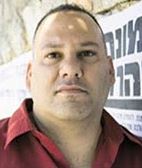
Dr. Shlomi Doron
המכללה האקדמית אשקלון > רשות המחקר והפרסומים > רשות המחקר והפרסומים > Researchers > Dr. Shlomi DoronEmail: shlomidoron@013.net
Phone:+972-54-4997088
Field of expertise:
Society and education, anthropology, sociology, ritual activity and public events, study of the Holocaust and forensic anthropology, anthropology as a principal scientific discipline including studies about rites of passage, rites of self-definition, festivals and public events: In the framework of my master’s degree I conducted an in-depth study that included interviews with survivors from Korczak’s orphanage. In addition, I performed a textual analysis of a show by the name of The Post Office. This play is unique in that it was written in the early 20th century by philosopher and writer Rabindranath Tagore, and led to his winning the Nobel Prize for Literature in 1912. Educator and author Janus Korczak took this play and turned it into a rite of passage on July 18, 1942 (four days before he and the children at the orphanage were deported to Treblinka) – for the children themselves in preparation for their death, for the large crowd that filled the hall and vis-à-vis the grim situation that all of them were in. Korczak, in his wisdom, knew that the end was near and therefore he decided to use this text. In my three-year study I managed to uncover versions of the play in Polish, Hebrew and English. I also uncovered the invitation to the play, which was written by Korczak himself. I analyzed the events of that period using the anthropological concepts of rites of passage, liminality and binary pairs, conceived by anthropologist and linguist Claude Levi-Strauss.
For many years I have been an outstanding teaching assistant in the Introduction to Anthropology course at Ashkelon Academic College. I lecture at the College of Judea and Samaria, teaching a course entitled Theories in Anthropology, in which I convey extensive anthropological knowledge related to this world.
Ultra-Orthodox Society and its Various Characteristics – becoming Newly Religious versus becoming Newly Secular
In the framework of my doctoral dissertation, which I am completing this year, I conducted an anthropological study and fieldwork that took three years. In the framework of this unique study I conducted 87 in-depth interviews with newly religious and newly secular individuals. In addition to the interview I participated in many conventions held by the two groups, including some at yeshivas in Jerusalem and Bnei Brak. In this study I delved deeply into complex processes in contemporary ultra-Orthodox society and the innovation in this study will be from the aspect of the findings and from the theoretical aspect as well, where I use the three-stage model devised by anthropologists Arnold Van Gennep and Victor Turner and propose a new theoretical perspective that includes concepts of self-definition rites, liminoidity and complex communate processes. These concepts will be examined for the first time ever, on the processes of becoming newly religious and newly secular. This study serves as a unique window to ultra-Orthodox society and the phenomenon of entering and leaving a total society.
Additionally, this study offers new angles related to the concepts of work and leisure in religious society versus secular society. During the 2008 academic year I will teach two electives on the subject of the ultra-Orthodox world and religion and society at the College of Judea and Samaria.
Qualitative and Ethnographical Research Methods
The field of qualitative and ethnographical research has served as my basis for research over the past decade. In addition, I have been a teaching assistant in this course at the College of Judea and Samaria for many years and serve as a lecturer on these research methods, in a two-hour a week course. In the framework of the course I teach the students the various methods and expose them to a new world.
Sociology, Society and Education: Gaps in Israeli Society
Another pivotal area is the sociological perspective and, in particular, that which is related to the world of education and the gaps between the groups in Israeli society. I have served as an outstanding teaching assistant in the following courses at Ashkelon Academic College for many years: Sociology in Israeli Society; Introduction to Sociology. I lecture at the College of Judea and Samaria, teaching an Introduction to Sociology course and the important Sociological Theories course, in which I am in charge of conveying the various theories in this field.
In addition, for the past 12 years I have volunteered and been active in the ISEF Foundation in the areas of education, narrowing gaps in Israeli society and the importance of higher education. In the framework of this activity I meet with various groups of young people and students throughout Israel and hold workshops on the subject.
I also serve as a teaching assistant at the College of Judea and Samaria, in a course entitled Issues in Israeli Society for Social Workers: Multiculturalism, Immigration to Israel and Migration, in the framework of the Social Work program.
Academic position: Lecturer

Major Publications:
Doron, Shlomi (2011). "Learning to Accept the Angel of Death with Equanimity",
Korczak and Tagore in Warsaw Ghetto". Biswas, Amalendu, Christine Marsh, Kalyan Kundu (Eds.). Rabindranath Tagore" A Timeless Mind. UK: Tagore Center and ICCR. pp. 74-83.
Doron, Shlomi (2013) Hamehalchim Bein Haolamot. Tel Aviv: Hakibutz Hamouchd.
Doron, Shlomi (2014). "Changing Identities Through Rituals: Newcomers and
Defectors from Ultra-Orthodox Judaism ". Journal of Ritual Studies, 27 (2): 13-32.
Doron, Shlomi (2017). "Identity Barriers and Exclusion in the Process of Hazara
Betsuvah by Nizrachim-Sephardim". Israeli Affairs,
Doron, Shlomi (2017). "Haredi Mothers Affairs: Deviance in Close Community".
International Journal of Criminology and Sociological Theory,
Berg, Jacob and Shlomi Doron (2017). "Drug, Alcohol and Food Addiction Trends on
the Web". International Journal of Medicine and Biomedical Sciences.
Doron, Shlomi (2018). "Korczak and agore and the History Point". Michalak, Marek
(Ed.). The Rights of the Child Yesterday, Today and Tomorrow. Warsaw: Biuro.
pp. 474-535.
Doron, Shlomi (2019). "Tool Box: Korczak for Teachers". Education for Teachers.
Seattle.






